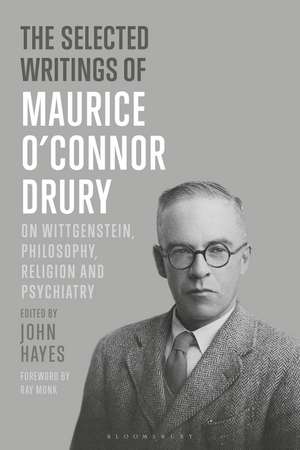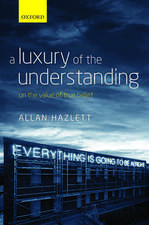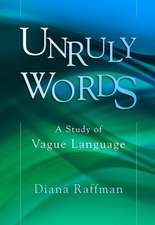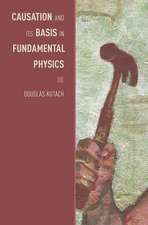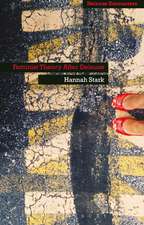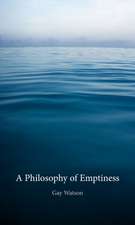The Selected Writings of Maurice O’Connor Drury: On Wittgenstein, Philosophy, Religion and Psychiatry
Autor Dr Maurice O’Connor Drury Editat de Professor John Hayes Cuvânt înainte de Ray Monken Limba Engleză Paperback – 31 oct 2018
| Toate formatele și edițiile | Preț | Express |
|---|---|---|
| Paperback (1) | 246.48 lei 6-8 săpt. | |
| Bloomsbury Publishing – 31 oct 2018 | 246.48 lei 6-8 săpt. | |
| Hardback (1) | 869.70 lei 6-8 săpt. | |
| Bloomsbury Publishing – 20 sep 2017 | 869.70 lei 6-8 săpt. |
Preț: 246.48 lei
Preț vechi: 278.53 lei
-12% Nou
Puncte Express: 370
Preț estimativ în valută:
47.18€ • 51.26$ • 39.66£
47.18€ • 51.26$ • 39.66£
Carte tipărită la comandă
Livrare economică 21 aprilie-05 mai
Preluare comenzi: 021 569.72.76
Specificații
ISBN-13: 9781350091542
ISBN-10: 1350091545
Pagini: 472
Dimensiuni: 156 x 234 x 30 mm
Greutate: 0.79 kg
Editura: Bloomsbury Publishing
Colecția Bloomsbury Academic
Locul publicării:London, United Kingdom
ISBN-10: 1350091545
Pagini: 472
Dimensiuni: 156 x 234 x 30 mm
Greutate: 0.79 kg
Editura: Bloomsbury Publishing
Colecția Bloomsbury Academic
Locul publicării:London, United Kingdom
Caracteristici
Brings together notes on conversations with Wittgenstein, lectures on psychiatry and letters to Rush Rhees on religion providing insights into the life and thought of one of philosophy's most influential philosophers
Notă biografică
John Hayes is Professor of Philosophy and Dean of the Faculty of Arts at Mary Immaculate College, University of Limerick, Ireland.Ray Monk is Professor of Philosophy at the University of Southampton, UK. He has published award-winning biographies of Ludwig Wittgenstein and Bertrand Russell. His most recent book is Inside the Centre: the Life of J. Robert Oppenheimer (2012, Jonathan Cape).
Cuprins
List of IllustrationsAcknowledgementsForeword, by Ray MonkAbbreviationsPrefaceI. Drury and Wittgenstein: Kindred Souls by John HayesII. Recollections of Wittgenstein- Contribution to a BBC Symposium- Conversations with Wittgenstein- Some Notes on Conversations with WittgensteinIII. Philosophical Writings- Methods of Philosophy Lecture: 1935- Letters to a Student of Philosophy: 1954- Six Reflections Shared with Rush Rhees- University College Dublin Lecture: 1967- Letter to Rush RheesIV. On Religion- Letters to Rhees- Undated Letter Extract- Letter to D.Z. Phillips: 23 July 1964V. On Medicine, Psychiatry and Psychology- The Danger of Words- Review of Danger of Words by Ilham Dilman- Fact and Hypothesis- Letters to Rhees- Introductory Lectures on Hypnosis- Counsel to TownsendVI. Biographical & Historical NotesIndex
Recenzii
But beyond Drury's recollections of, and conversations with, Wittgenstein, many of the writings in this collection have independent value-not least Drury's essay on the method of philosophy, his exchanges with Rush Rhees on religion, and his most famous work, The Danger of Words.
A splendid book that provides an interesting, original perspective on Wittgenstein's thought . . . A substantial work excellently assembled and edited by Prof John Hayes. It is of interest to the general reader as well as to students of philosophy or psychiatry.
This wide-ranging selection of his writings by John Hayes of the University of Limerick is a welcome and long overdue publication . . . The collection combines Drury's much-cited recollections of Wittgenstein with his own philosophical writings, including his extensive correspondence with Rush Rhees (Wittgenstein's main literary executor), reflections on religion, and essays on medicine, psychiatry and hypnosis. The editor concedes that were it not for Drury's association with Wittgenstein the collection might not have found its way into print, but it is all the more valuable for this: Ray Monk, Wittgenstein's biographer, noted of Drury's only philosophical work published during his lifetime, The Danger of Words (1973, reprinted in this collection), that it was "the most truly Wittgensteinian work published by any of Wittgenstein's students.
These Selected Writings. . ., excellently edited by John Hayes, provide us with a comprehensive picture of Drury's corpus, bringing together all the scattered pieces already in print as well as a considerable amount of unpublished material ... Drury's unique voice on the philosophy he learnt from his teacher is valuable; it is embedded in the life he lived as much as in his intellectual questing.
In editing this collection so carefully and so scrupulously, John Hayes has provided an important service to those of us who have become admirers of Drury. His account of Drury's life, and, especially, of Drury's relationship with Wittgenstein, is rich in insight, detail and fresh information. The pieces by Drury that have previously been published - his articles about his conversations with Wittgenstein and the papers that made up The Danger of Words - are published here in a way that allows the readers to better understand the context in which they were written. And then there is the new material - the letters to Rush Rhees about philosophy and religion, the BBC broadcast about Wittgenstein, and the lecture on philosophy that Drury gave at University College Dublin - all of which is collected here together with extraordinarily complete annotations.
As shown by the work of Störring, Ziehen, Jaspers, Janet, Mourgue, Morselli, Ey, Lanteri-Laura, Martin-Santos, Kimura, etc., the psychiatrist-philosopher remains a cultural archetype. Con Drury's work showed that such a figure was also present in Great Britain. Lovingly edited by John Hayes, this volume illustrates the usefulness to psychiatry of conceptual analysis and of a way of thinking that, alas, is now rarely exercised by its practitioners.
This meticulously edited collection brings together, for the first time, some of the most important published and unpublished writings of Maurice O'Conner Drury, pupil and life-long friend of Ludwig Wittgenstein. Drury's writings provide a unique insight into Wittgenstein's thinking about philosophy and religion. They also give the reader an opportunity to fully appreciate the significance of Drury's own philosophically inspired thinking about medicine and psychiatry. The book is an invaluable resource for all those interested in the life and work of one of the greatest philosophers of 20th century. It is also of great significance for illuminating the subtle connections between philosophy, religion and medicine that were at the heart of Drury's own thinking.
Intelligently and humanely curated by its editor, this collection will remain the definitive volume on Drury's life and his life-defining relationship with Wittgenstein.
For readers who are too busy, hassled or otherwise preoccupied to read beyond the first lines of this review, I will summarise at this point: this volume is entirely splendid.
A splendid book that provides an interesting, original perspective on Wittgenstein's thought . . . A substantial work excellently assembled and edited by Prof John Hayes. It is of interest to the general reader as well as to students of philosophy or psychiatry.
This wide-ranging selection of his writings by John Hayes of the University of Limerick is a welcome and long overdue publication . . . The collection combines Drury's much-cited recollections of Wittgenstein with his own philosophical writings, including his extensive correspondence with Rush Rhees (Wittgenstein's main literary executor), reflections on religion, and essays on medicine, psychiatry and hypnosis. The editor concedes that were it not for Drury's association with Wittgenstein the collection might not have found its way into print, but it is all the more valuable for this: Ray Monk, Wittgenstein's biographer, noted of Drury's only philosophical work published during his lifetime, The Danger of Words (1973, reprinted in this collection), that it was "the most truly Wittgensteinian work published by any of Wittgenstein's students.
These Selected Writings. . ., excellently edited by John Hayes, provide us with a comprehensive picture of Drury's corpus, bringing together all the scattered pieces already in print as well as a considerable amount of unpublished material ... Drury's unique voice on the philosophy he learnt from his teacher is valuable; it is embedded in the life he lived as much as in his intellectual questing.
In editing this collection so carefully and so scrupulously, John Hayes has provided an important service to those of us who have become admirers of Drury. His account of Drury's life, and, especially, of Drury's relationship with Wittgenstein, is rich in insight, detail and fresh information. The pieces by Drury that have previously been published - his articles about his conversations with Wittgenstein and the papers that made up The Danger of Words - are published here in a way that allows the readers to better understand the context in which they were written. And then there is the new material - the letters to Rush Rhees about philosophy and religion, the BBC broadcast about Wittgenstein, and the lecture on philosophy that Drury gave at University College Dublin - all of which is collected here together with extraordinarily complete annotations.
As shown by the work of Störring, Ziehen, Jaspers, Janet, Mourgue, Morselli, Ey, Lanteri-Laura, Martin-Santos, Kimura, etc., the psychiatrist-philosopher remains a cultural archetype. Con Drury's work showed that such a figure was also present in Great Britain. Lovingly edited by John Hayes, this volume illustrates the usefulness to psychiatry of conceptual analysis and of a way of thinking that, alas, is now rarely exercised by its practitioners.
This meticulously edited collection brings together, for the first time, some of the most important published and unpublished writings of Maurice O'Conner Drury, pupil and life-long friend of Ludwig Wittgenstein. Drury's writings provide a unique insight into Wittgenstein's thinking about philosophy and religion. They also give the reader an opportunity to fully appreciate the significance of Drury's own philosophically inspired thinking about medicine and psychiatry. The book is an invaluable resource for all those interested in the life and work of one of the greatest philosophers of 20th century. It is also of great significance for illuminating the subtle connections between philosophy, religion and medicine that were at the heart of Drury's own thinking.
Intelligently and humanely curated by its editor, this collection will remain the definitive volume on Drury's life and his life-defining relationship with Wittgenstein.
For readers who are too busy, hassled or otherwise preoccupied to read beyond the first lines of this review, I will summarise at this point: this volume is entirely splendid.
